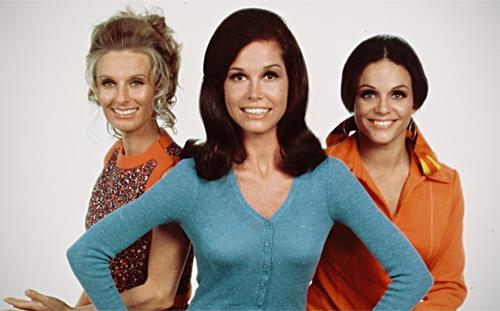
Opening scene: Aging Boomer, once a hippie wannabe, isn't eavesdropping, but can't help overhearing his granddaughter and her boyfriend talking about a funny sketch they just streamed on their phone. In what would be an anachronistic oddity to them, he also has seen the sketch in question. When they notice he has heard their conversation, they politely explain what streaming is and who the performers were.
He surprises them by mentioning some of the funnier lines in this and some other videos posted by the same performers. They are as impressed as they are amused. Then he loses them; he mentions how the sketch they were discussing was a bit derivative of the Taxi episode in which Rev. Jim takes a driver license exam. Their faces turn from blank to blanker when he tells them elements of the “Chuckles the Clown” episode of The Mary Tyler Moore Show were not so well disguised in another of the videos.
That's when he realizes they have no idea what Taxi nor The Mary Tyler Moore Show (top) is. He also realizes that some major parts of television's excellent past are in danger of being lost in many people's present and future due to ignorance of their existence.
More than being enjoyable viewing for people who remember pre-thousands-of-choices television, programs like Mary Tyler Moore: A Celebration are important because they pull examples of important television from out of today's video haystack and show the ground they broke and the standards they helped set. (It airs Oct. 13 at 8 p.m. ET on PBS -- check local listings.) Short of a well-presented college course, there aren't too many places to discover such things.
Michael J. Trinklein and Steven Boettcher are producers who have done a lot to keep generational obscurity from devouring worthy television history. They have done sixteen Pioneers of Television programs for PBS (http://www.pbs.org/wnet/pioneers-of-television/ ) in which many different themes of television history are given interesting overviews. Last year they produced a Robin Williams special for PBS, and its success led to the Mary Tyler Moore documentary.
In a recent interview, Trinklein said they have at least twenty more television genres they would like to add to the Pioneers collection and several more TV icons they would like to add to the solo profiles. In what they have done and what they are planning, they have invented their own genre -- an important one that commercial cable hasn't yet stolen and corrupted. They are a perfect pair, it would seem, to take on such a responsibility. Like so many people who grew up with the new medium, television has been central in their lives -- though their early exposures differed.
"Steve's parents wouldn't let him watch too much TV," Trinklein said. "I watched everything."
He said watching I Love Lucy still makes him hungry because, when younger, he would watch daily at 4 p.m. "and dinner was not quite ready yet."
The two met in college, where they studied television. He said they arranged their classes for later in the day so they wouldn't miss David Letterman's daytime program.
They didn't immediately begin their chronicling of classic television after graduation. That took about a decade, he said, during which they did "smaller films and corporate work." He broadly outlined how they divide duties for the PBS series of programs: Trinklein (on left, with Andy Griffith, Boettcher on right) does the interviewing while Boettcher secures those interviews. The people who agreed to talk about Mary Tyler Moore include Carl Reiner, Dick Van Dyke, Betty White, Ed Asner and several others who worked with the actress and know her well.
"Everybody we asked was really gracious," Trinklein said.
Another interviewee, just as impressive, though she never worked with Moore but admired her, is Oprah Winfrey, who said, "Mary Tyler Moore had more influence on my career than any other single person or force." The program includes a version of the famous MTM throwing-her-hat-in-the-air show opening which Winfrey reshot with herself in the role. It was part of a tribute to Moore on one of Winfrey's talk shows. It's not only an homage to an icon by an icon; it's a rarely seen clip, one Winfrey gave to the producers and suggested they use.
Mary Tyler Moore: A Celebration is a lovingly made and enjoyable hour. And though some who know much more about the history of television may find fault with the Trinklein-Boettcher overviews, those of us among the masses win by watching.